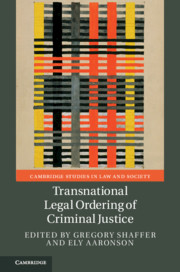Book contents
- Reviews
- Transnational Legal Ordering of Criminal Justice
- Cambridge Studies in Law and Society
- Transnational Legal Ordering of Criminal Justice
- Copyright page
- Dedication
- Contents
- Figures
- Tables
- Contributors
- Acknowledgments
- Part I Introduction
- Part II Transnational Legal Ordering and Transnational Crimes
- Chapter Two Why Do Transnational Legal Orders Persist?
- Chapter Three Transnational Criminal Law or the Transnational Legal Ordering of Corruption?
- Chapter Four Transnational Criminal Law in a Globalized World
- Chapter Five The Criminalization of Migration
- Chapter Six The Strange Career of the Transnational Legal Order of Cannabis Prohibition
- Part III Transnational Legal Ordering and International Crimes
- Part IV Transnational Legal Ordering and Human Rights Standards in Criminal Justice
- Part V Conclusion
- Index
- Cambridge Studies in Law and Society
- References
Chapter Three - Transnational Criminal Law or the Transnational Legal Ordering of Corruption?
Theorizing Australian Corporate Foreign Bribery Reforms
from Part II - Transnational Legal Ordering and Transnational Crimes
Published online by Cambridge University Press: 05 June 2020
- Reviews
- Transnational Legal Ordering of Criminal Justice
- Cambridge Studies in Law and Society
- Transnational Legal Ordering of Criminal Justice
- Copyright page
- Dedication
- Contents
- Figures
- Tables
- Contributors
- Acknowledgments
- Part I Introduction
- Part II Transnational Legal Ordering and Transnational Crimes
- Chapter Two Why Do Transnational Legal Orders Persist?
- Chapter Three Transnational Criminal Law or the Transnational Legal Ordering of Corruption?
- Chapter Four Transnational Criminal Law in a Globalized World
- Chapter Five The Criminalization of Migration
- Chapter Six The Strange Career of the Transnational Legal Order of Cannabis Prohibition
- Part III Transnational Legal Ordering and International Crimes
- Part IV Transnational Legal Ordering and Human Rights Standards in Criminal Justice
- Part V Conclusion
- Index
- Cambridge Studies in Law and Society
- References
Summary
To date, “transnational criminal law” has been the dominant paradigm for explaining and mapping rules on corruption in the international legal literature. This Chapter details the limits of transnational criminal conceptions of “anticorruption” through a study of nascent changes to Australian corporate foreign bribery law. Drawing on primary and secondary documentary sources, it shows that the proposed (but for now lapsed) reforms are only partially transnational, as that term is understood in “TCL” theory. Likewise, multilateral suppression conventions and related soft laws were but one impetus for the suggested amendments. Rather, as the transnational legal ordering literature suggests, a recursive process appears to have been at work between international organizations and local legislators, as well as transnational non-state actors. This process was marked, it seems, by moments of borrowing from the US and UK. However, it was also punctuated by themes of modernization, efficiency, and reputation. In addition, if settled, the amendments would result, not just in changes to national criminal law, but also the extension of “new” – and controversial – techniques of governance.
Keywords
- Type
- Chapter
- Information
- Transnational Legal Ordering of Criminal Justice , pp. 84 - 119Publisher: Cambridge University PressPrint publication year: 2020
References
- 2
- Cited by

